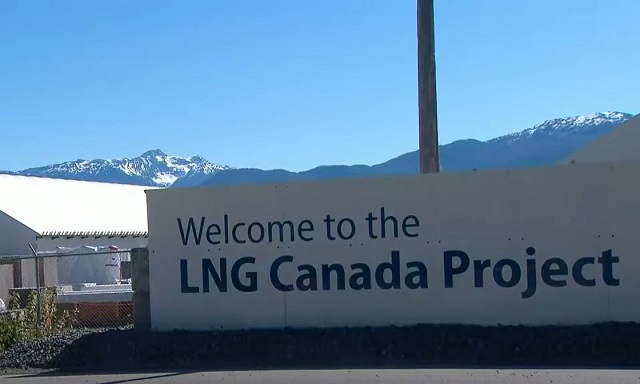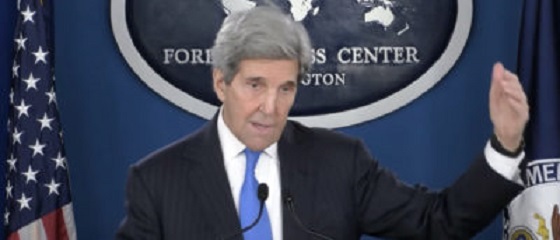Energy
Canada’s Climate Fetish Could Decimate Key Industry For First Nations

 From the Daily Caller News Foundation
From the Daily Caller News Foundation
Obsessed with the faux climate crisis, the Canadian government in Ottawa seemingly discounts altogether the social and economic benefits of natural gas to First Nations communities of the country’s western region.
Approximately 5% of the world’s gas comes from Canada, mainly from the vast Western Canadian Sedimentary Basin underlying several provinces, including British Columbia, Alberta and Saskatchewan. In 2023, the country ranked fifth in global production behind the U.S., Russia, Iran and China.
Some First Nations communities — a designation that takes in indigenous people living south of the Arctic Circlehave — historically faced challenges in terms of economic development and social well-being. Limited access to education, healthcare and infrastructure has resulted in lower living standards compared to the national averagea — fact that I observed firsthand as a researcher in British Columbia. Unemployment rates are often higher in First Nations communities, and poverty remains a persistent issue.
However, oil and gas development has provided a pathway to prosperity for many of these communities. Liquified natural gas (LNG) projects, for example, require a significant workforce in both construction and operational phases. This translates into direct employment opportunities and much needed income for First Nations people otherwise lacking financial security.
The development of natural gas resources also necessitates infrastructure upgrades in nearby communities. These can include the construction or enhancements of roads, bridges and communication networks. Such improvements benefit the entire community by providing access to markets, educational opportunities and other essential services.
“For far too long, First Nations could only watch as others built generational wealth from the resources of our traditional lands” says Eva Clayton, president of the Nisga’a Lisims government. “But times are changing.”
First Nations participation in natural gas development goes beyond economic benefits. It represents an opportunity for communities to assert their self-determination and participate in shaping their own future. Communities can participate in natural gas projects through equity ownership and various arrangements, including Impact Benefit Agreements. According to the Canada Energy Centre, more than 75 First Nations and Métis communities in Alberta and British Columbia have agreed to ownership stakes in energy projects, including the Coastal GasLink pipeline and major transportation networks for oil sands production.
One such example is the recent Musqueam Partnership agreement by FortisBC, which will share the benefits of the Tilbury LNG facility’s expansion phase to begin in 2025. First Nations beneficiaries will include communities of the Snuneymuxw, T’Sou-ke, Esquimalt, Scia’new, Pacheedaht, Pauquachin, Huu-ay-aht, Kyuquot/Checleseht, Toquaht, Uchucklesaht and Ucluelet. Similarly, the Woodfibre LNG project to begin production in 2027 will directly benefit the Squamish community.
DemandObsessed with the faux climate crisis, the Canadian government in Ottawa seemingly discounts altogether the social and economic benefits of natural gas to First Nations communities for natural gas in North America and across the world should ensure increasing prosperity into the future, unless the federal government’s climate fetish undermines the industry.
Just such a possibility has prompted an alarm to be sounded by the First Nations LNG Alliance—a collective of communities supportive of LNG development in British Columbia.
“First Nations have made their choice about the LNG opportunity, informed by research and consultation,” says Karen Ogen, CEO of the LNG Alliance.
“However, when 88 environmental groups and other organizations recently demanded an end to LNG, no one bothered to talk to us,” she said. “I view that as a ‘re-colonization’ of energy by environmentalists. It’s a type of eco-colonialism that First Nations people like me are all-too familiar with, particularly as we seek to diversify our economies and provide opportunities for young people and future generations.”
Ms. Ogen’s complaint of “eco-colonialism” is not unlike the charge of “climate imperialism” that has been leveled against Western elites by leaders of the Global South who bristle at being pressured to adopt “green” agendas at the expense of actual economic development supported gas and other fossil fuels.
Indeed, the sentiments of Ms. Ogen almost certainly resonate with those who favor common sense over ideology. “Canadian LNG is Indigenous LNG, and that is good for the world and good for all of us here,” she says.
Vijay Jayaraj is a Research Associate at the CO2 Coalition, Arlington, Virginia. He holds a master’s degree in environmental sciences from the University of East Anglia, U.K.
Daily Caller
John Kerry Lurches Back Onto Global Stage For One Final Gasp


From the Daily Caller News Foundation
John Kerry, one of the grandest and most persistent climate scolds of the 21stcentury, lurched back into the news this week when he was knighted by Britain’s King Charles, a prominent climate scold in his own right.
In fact, their shared efforts involving flying off on carbon-spewing private jets to lecture the masses to live smaller, more costly lives in the name of fighting climate change was the motivation for the award, as the King thanked Kerry for his “services to tackling climate change.” That seems to be a bit of a grammatical error, but when royalty is involved, no one really cares, do they?
“King Charles and I share the same point of view — that there’s an urgency to doing things,” Kerry told the Globe in an interview. “He’s been ahead of most folks on this from the time I can remember… He always had a commitment to nature.”
Unfortunately for the U.K.’s citizens, the Labour government’s “commitment to nature” mainly appears to involve covering thousands of acres of bucolic British farmland with massive solar arrays and felling thousands of forest trees to make home to big wind installations these days.
Projects like those – frequently forced by the central government on objecting rural communities – form the centerpiece of Secretary of State for Energy Security and Net Zero Ed Miliband’s program to deindustrialize the formerly formidable British economy.
That program – based on the shared philosophy of King Charles and Kerry – has sent the U.K.’s utility rates skyrocketing to the highest on earth. It has also rendered the former global power dependent on imports from foreign nations for its energy security, with China the most prominent among them.
Such are the fruits of the King Charles/Kerry “point of view.” Most would agree with Kerry’s statement that “there’s an urgency to doing things.” The problem is that pretty much everything he and the King have been doing in this realm across the first quarter of the 21st century leads inevitably to serfdom to the Chinese Communist Party.
In an interview with the Financial Times the same day, Kerry repeated much of the tiresome dogma of his alarmist religion, in the process excoriating President Donald Trump as a “denier” and calling U.S. corporate leaders cowards for straying from the narrative he and the King prefer. “It is not that they don’t believe [in climate change] or they don’t want to move forward. They are just scared,” Kerry said of the corporate CEOs, adding, “The process of Donald Trump in the last months, coupled with the justice department, coupled with his vengeance programs, has scared… a lot of people.”
But a more believable alternative explanation for the shift away from the twin manias of ESG and DEI by many companies in recent years is that these corporate leaders have a fiduciary duty to maximize returns on capital to their investors. The problem for Kerry and his disciples is that the preferred alternatives they have advanced too often devolved into unprofitable boondoggles that fail to satisfy that duty. Kerry wants to place the entire blame on Trump – who, ironically, was recently honored by King Charles himself with an unprecedented second state dinner. But the truth is that shift started in earnest in 2023, when Joe Biden’s autopen was still in charge of the ship of American state.
That shift has certainly accelerated this year, as companies have been freed from the incessant hectoring of the Biden government and are now being denied access to the ruinous green subsidies from the IRA that so radically distorted energy markets. This has little to do with climate denialism or cowardice and much to do with sound business practice and CEOs properly carrying out the mandates of their high positions. No amount of hyperbolic talking points from Kerry or the King can change that reality.
In the end, Kerry’s remarks come off as a lot of sound and fury signifying nothing. Now in the twilight of his career, he has become a relic, a totem of a fading global religion whose end cannot come soon enough.
David Blackmon is an energy writer and consultant based in Texas. He spent 40 years in the oil and gas business, where he specialized in public policy and communications.
Alberta
IEA peak-oil reversal gives Alberta long-term leverage

This article supplied by Troy Media.
The peak-oil narrative has collapsed, and the IEA’s U-turn marks a major strategic win for Alberta
After years of confidently predicting that global oil demand was on the verge of collapsing, the International Energy Agency (IEA) has now reversed course—a stunning retreat that shatters the peak-oil narrative and rewrites the outlook for oil-producing regions such as Alberta.
For years, analysts warned that an oil glut was coming. Suddenly, the tide has turned. The Paris-based IEA, the world’s most influential energy forecasting body, is stepping back from its long-held view that peak oil demand is just around the corner.
The IEA reversal is a strategic boost for Alberta and a political complication for Ottawa, which now has to reconcile its climate commitments with a global outlook that no longer supports a rapid decline in fossil fuel use or the doomsday narrative Ottawa has relied on to advance its climate agenda.
Alberta’s economy remains tied to long-term global demand for reliable, conventional energy. The province produces roughly 80 per cent of Canada’s oil and depends on resource revenues to fund a significant share of its provincial budget. The sector also plays a central role in the national economy, supporting hundreds of thousands of jobs and contributing close to 10 per cent of Canada’s GDP when related industries are included.
That reality stands in sharp contrast to Ottawa. Prime Minister Mark Carney has long championed net-zero timelines, ESG frameworks and tighter climate policy, and has repeatedly signalled that expanding long-term oil production is not part of his economic vision. The new IEA outlook bolsters Alberta’s position far more than it aligns with his government’s preferred direction.
Globally, the shift is even clearer. The IEA’s latest World Energy Outlook, released on Nov. 12, makes the reversal unmistakable. Under existing policies and regulations, global demand for oil and natural gas will continue to rise well past this decade and could keep climbing until 2050. Demand reaches 105 million barrels per day in 2035 and 113 million barrels per day in 2050, up from 100 million barrels per day last year, a direct contradiction of years of claims that the world was on the cusp of phasing out fossil fuels.
A key factor is the slowing pace of electric vehicle adoption, driven by weakening policy support outside China and Europe. The IEA now expects the share of electric vehicles in global car sales to plateau after 2035. In many countries, subsidies are being reduced, purchase incentives are ending and charging-infrastructure goals are slipping. Without coercive policy intervention, electric vehicle adoption will not accelerate fast enough to meaningfully cut oil demand.
The IEA’s own outlook now shows it wasn’t merely off in its forecasts; it repeatedly projected that oil demand was in rapid decline, despite evidence to the contrary. Just last year, IEA executive director Fatih Birol told the Financial Times that we were witnessing “the beginning of the end of the fossil fuel era.” The new outlook directly contradicts that claim.
The political landscape also matters. U.S. President Donald Trump’s return to the White House shifted global expectations. The United States withdrew from the Paris Agreement, reversed Biden-era climate measures and embraced an expansion of domestic oil and gas production. As the world’s largest economy and the IEA’s largest contributor, the U.S. carries significant weight, and other countries, including Canada and the United Kingdom, have taken steps to shore up energy security by keeping existing fossil-fuel capacity online while navigating their longer-term transition plans.
The IEA also warns that the world is likely to miss its goal of limiting temperature increases to 1.5 °C over pre-industrial levels. During the Biden years, the IAE maintained that reaching net-zero by mid-century required ending investment in new oil, gas and coal projects. That stance has now faded. Its updated position concedes that demand will not fall quickly enough to meet those targets.
Investment banks are also adjusting. A Bloomberg report citing Goldman Sachs analysts projects global oil demand could rise to 113 million barrels per day by 2040, compared with 103.5 million barrels per day in 2024, Irina Slav wrote for Oilprice.com. Goldman cites slow progress on net-zero policies, infrastructure challenges for wind and solar and weaker electric vehicle adoption.
“We do not assume major breakthroughs in low-carbon technology,” Sachs’ analysts wrote. “Even for peaking road oil demand, we expect a long plateau after 2030.” That implies a stable, not shrinking, market for oil.
OPEC, long insisting that peak demand is nowhere in sight, feels vindicated. “We hope … we have passed the peak in the misguided notion of ‘peak oil’,” the organization said last Wednesday after the outlook’s release.
Oil is set to remain at the centre of global energy demand for years to come, and for Alberta, Canada’s energy capital, the IEA’s course correction offers renewed certainty in a world that had been prematurely writing off its future.
Toronto-based Rashid Husain Syed is a highly regarded analyst specializing in energy and politics, particularly in the Middle East. In addition to his contributions to local and international newspapers, Rashid frequently lends his expertise as a speaker at global conferences. Organizations such as the Department of Energy in Washington and the International Energy Agency in Paris have sought his insights on global energy matters.
Troy Media empowers Canadian community news outlets by providing independent, insightful analysis and commentary. Our mission is to support local media in helping Canadians stay informed and engaged by delivering reliable content that strengthens community connections and deepens understanding across the country.
-

 Alberta2 days ago
Alberta2 days agoFrom Underdog to Top Broodmare
-

 Business2 days ago
Business2 days agoMan overboard as HMCS Carney lists to the right
-

 Daily Caller1 day ago
Daily Caller1 day ago‘No Critical Thinking’: Parents Sound Alarm As Tech Begins To ‘Replace The Teacher’
-

 Alberta2 days ago
Alberta2 days agoFalling resource revenue fuels Alberta government’s red ink
-

 Business2 days ago
Business2 days agoHigher carbon taxes in pipeline MOU are a bad deal for taxpayers
-

 Alberta2 days ago
Alberta2 days agoREAD IT HERE – Canada-Alberta Memorandum of Understanding – From the Prime Minister’s Office
-

 Alberta1 day ago
Alberta1 day agoIEA peak-oil reversal gives Alberta long-term leverage
-

 Alberta1 day ago
Alberta1 day agoAlberta can’t fix its deficits with oil money: Lennie Kaplan




